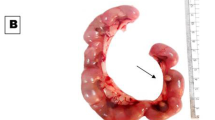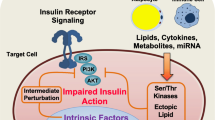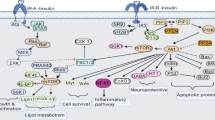Abstract
Epidemiological evidences show that prenatal caffeine exposure (PCE) could induce intrauterine growth retardation (IUGR). The IUGR offspring also present glucose intolerance and type 2 diabetes mellitus after maturity. We have previously demonstrated that PCE induced IUGR and increased susceptibility to adult metabolic syndrome in rats. This study aimed to further investigate the effects of PCE on glucose homeostasis in adult offspring rats. Pregnant rats were administered caffeine (120 mg/kg/day, intragastrically) from gestational days 11 to 20. PCE offspring presented partial catch-up growth pattern after birth, characterizing by the increased body weight gain rates. Meanwhile, PCE had no significant influences on the basal blood glucose and insulin phenotypes of adult offspring but increased the glucose tolerance, glucose-stimulated insulin section and β cell sensitivity to glucose in female progeny. The insulin sensitivity of both male and female PCE offspring were enhanced accompanied with reduced β cell fraction and mass. Western blotting results revealed that significant augmentation in protein expression of hepatic insulin signaling elements of PCE females, including insulin receptor (INSR), insulin receptor substrate 1 (IRS-1) and the phosphorylation of serine–threonine protein kinase (Akt), was also potentiated. In conclusion, we demonstrated that PCE reduced the pancreatic β mass but increased the glucose tolerance in adult offspring rats, especially for females. The adaptive compensatory enhancement of β cell responsiveness to glucose and elevated insulin sensitivity mainly mediated by upregulated hepatic insulin signaling might coordinately contribute to the increased glucose tolerance.





Similar content being viewed by others
References
Aldridge A, Aranda JV et al (1979) Caffeine metabolism in the newborn. Clin Pharmacol Ther 25(4):447–453
Bakker R, Steegers EA et al (2010) Maternal caffeine intake from coffee and tea, fetal growth, and the risks of adverse birth outcomes: the Generation R Study. Am J Clin Nutr 91(6):1691–1698. https://doi.org/10.3945/ajcn.2009.28792
Battiston FG, Dos Santos C et al (2017) Glucose homeostasis in rats treated with 4-vinylcyclohexene diepoxide is not worsened by dexamethasone treatment. J Steroid Biochem Mol Biol 165(Pt B):170–181. https://doi.org/10.1016/j.jsbmb.2016.06.001
Bertin E, Gangnerau MN et al (1999) Glucose metabolism and beta-cell mass in adult offspring of rats protein and/or energy restricted during the last week of pregnancy. Am J Phys 277(1 Pt 1):E11–E17
Bo S, Cavallo-Perin P et al (2000) Low birthweight and metabolic abnormalities in twins with increased susceptibility to Type 2 diabetes mellitus. Diabet Med: J Br Diabet Assoc 17(5):365–370
Camacho LE, Chen X et al (2017) Enhanced insulin secretion and insulin sensitivity in young lambs with placental insufficiency-induced intrauterine growth restriction. Am J Physiol Regul Integr Comp Physiol 313(2):R101–R109. https://doi.org/10.1152/ajpregu.00068.2017
Cayetanot F, Larnicol N et al (2009) Antenatal environmental stress and maturation of the breathing control, experimental data. Respir Physiol Neurobiol 168(1–2):92–100. https://doi.org/10.1016/j.resp.2009.04.024
Chen LW, Wu Y et al (2014) Maternal caffeine intake during pregnancy is associated with risk of low birth weight: a systematic review and dose-response meta-analysis. BMC Med 12:174. https://doi.org/10.1186/s12916-014-0174-6
Cherrington AD, Edgerton D et al (1998) The direct and indirect effects of insulin on hepatic glucose production in vivo. Diabetologia 41(9):987–996. https://doi.org/10.1007/s001250051021
Frary CD, Johnson RK et al (2005) Food sources and intakes of caffeine in the diets of persons in the United States. J Am Diet Assoc 105(1):110–113. https://doi.org/10.1016/j.jada.2004.10.027
Garg M, Thamotharan M et al (2013) Glucose intolerance and lipid metabolic adaptations in response to intrauterine and postnatal calorie restriction in male adult rats. Endocrinology 154(1):102–113. https://doi.org/10.1210/en.2012-1640
Garofano A, Czernichow P et al (1997) In utero undernutrition impairs rat beta-cell development. Diabetologia 40(10):1231–1234. https://doi.org/10.1007/s001250050812
Gluckman PD, Hanson MA et al (2007) Early life events and their consequences for later disease: a life history and evolutionary perspective. Am J Hum Biol: Off J Hum Biol Counc 19(1):1–19. https://doi.org/10.1002/ajhb.20590
Godsland IF (2005) Oestrogens and insulin secretion. Diabetologia 48(11):2213–2220. https://doi.org/10.1007/s00125-005-1930-0
Gosby AK, Maloney CA et al (2010) Elevated insulin sensitivity in low-protein offspring rats is prevented by a high-fat diet and is associated with visceral fat. Obesity 18(8):1593–1600. https://doi.org/10.1038/oby.2009.449
Group CS (2008) Maternal caffeine intake during pregnancy and risk of fetal growth restriction: a large prospective observational study. BMJ 337:a2332. https://doi.org/10.1136/bmj.a2332
Heikkinen S, Argmann CA, et al. (2007). Evaluation of glucose homeostasis. Curr Protoc Mol Biol Chapter 29: Unit 29B 23. doi:https://doi.org/10.1002/0471142727.mb29b03s77
Hill DJ, Duvillie B (2000) Pancreatic development and adult diabetes. Pediatr Res 48(3):269–274. https://doi.org/10.1203/00006450-200009000-00002
Inoue T, Kido Y et al (2009) Effect of intrauterine undernutrition during late gestation on pancreatic beta cell mass. Biomed Res Tokyo 30(6):325–330
James J, Thomas P et al (2004) Preventing childhood obesity by reducing consumption of carbonated drinks: cluster randomised controlled trial. Br Med J 328(7450):1237–1239. https://doi.org/10.1136/bmj.38077.458438.EE
Jensen CB, Storgaard H et al (2005) Young, low-birth-weight men are not more susceptible to the diabetogenic effects of a prolonged free fatty acid exposure than matched controls. Metab Clin Exp 54(10):1398–1406. https://doi.org/10.1016/j.metabol.2005.05.005
Jha PK, Foppen E et al (2016) Sleep restriction acutely impairs glucose tolerance in rats. Physiol Rep 4(12). 10.14814/phy2.12839
Kahn HS (2001) Glucose tolerance in adults after prenatal exposure to famine. Lancet 357(9270):1798–1799. https://doi.org/10.1016/S0140-6736(00)04911-4
Kahn SE, Prigeon RL et al (1993) Quantification of the relationship between insulin sensitivity and beta-cell function in human-subjects—evidence for a hyperbolic function. Diabetes 42(11):1663–1672. https://doi.org/10.2337/diabetes.42.11.1663
Knutti R, Rothweiler H et al (1982) The effect of pregnancy on the pharmacokinetics of caffeine. Arch Toxicol Suppl = Archiv fur Toxikologie Supplement 5:187–192
Kou H, Liu Y et al (2014) Maternal glucocorticoid elevation and associated blood metabonome changes might be involved in metabolic programming of intrauterine growth retardation in rats exposed to caffeine prenatally. Toxicol Appl Pharmacol. https://doi.org/10.1016/j.taap.2014.01.007
Laguna-Barraza R, Bermejo-Alvarez P et al (2012) Sex-specific embryonic origin of postnatal phenotypic variability. Reprod Fertil Dev 25(1):38–47. https://doi.org/10.1071/RD12262
Lim K, Armitage JA et al (2011) IUGR in the absence of postnatal “catch-up” growth leads to improved whole body insulin sensitivity in rat offspring. Pediatr Res 70(4):339–344
Liu Y, Xu D et al (2012) Fetal rat metabonome alteration by prenatal caffeine ingestion probably due to the increased circulatory glucocorticoid level and altered peripheral glucose and lipid metabolic pathways. Toxicol Appl Pharmacol 262(2):205–216. https://doi.org/10.1016/j.taap.2012.05.002
Louet JF, LeMay C et al (2004) Antidiabetic actions of estrogen: insight from human and genetic mouse models. Curr Atheroscler Rep 6(3):180–185
Luo ZC, Xiao L et al (2010) Mechanisms of developmental programming of the metabolic syndrome and related disorders. World J Diabetes 1(3):89–98. https://doi.org/10.4239/wjd.v1.i3.89
Luo H, Deng Z et al (2014) Prenatal caffeine ingestion induces transgenerational neuroendocrine metabolic programming alteration in second generation rats. Toxicol Appl Pharmacol 274(3):383–392. https://doi.org/10.1016/j.taap.2013.11.020
Luo H, Li J et al (2015) Prenatal caffeine exposure induces a poor quality of articular cartilage in male adult offspring rats via cholesterol accumulation in cartilage. Sci Rep 5:17746. https://doi.org/10.1038/srep17746
Muniyappa R, Lee S et al (2008) Current approaches for assessing insulin sensitivity and resistance in vivo: advantages, limitations, and appropriate usage. Am J Phys Endocrinol Metab 294(1):E15–E26. https://doi.org/10.1152/ajpendo.00645.2007
Ozanne SE (2001) Metabolic programming in animals. Br Med Bull 60:143–152. https://doi.org/10.1093/Bmb/60.1.143
Ozanne SE, Wang CL et al (1996) Altered muscle insulin sensitivity in the male offspring of protein-malnourished rats. Am J Phys 271(6 Pt 1):E1128–E1134
Rafacho A, Giozzet VA et al (2008) Functional alterations in endocrine pancreas of rats with different degrees of dexamethasone-induced insulin resistance. Pancreas 36(3):284–293. https://doi.org/10.1097/MPA.0b013e31815ba826
Rafacho A, Marroqui L et al (2010a) Glucocorticoids in vivo induce both insulin hypersecretion and enhanced glucose sensitivity of stimulus-secretion coupling in isolated rat islets. Endocrinology 151(1):85–95. https://doi.org/10.1210/en.2009-0704
Rafacho A, Quallio S et al (2010b) The adaptive compensations in endocrine pancreas from glucocorticoid-treated rats are reversible after the interruption of treatment. Acta Physiol (Oxf) 200(3):223–235. https://doi.org/10.1111/j.1748-1716.2010.02146.x
Resnik R (2002) Intrauterine growth restriction. Obstet Gynecol 99(3):490–496. https://doi.org/10.1016/S0029-7844(01)01780-X
Saleem T, Sajjad N et al (2011) Intrauterine growth retardation—small events, big consequences. Ital J Pediatr 37:41. https://doi.org/10.1186/1824-7288-37-41
Shen L, Liu Z et al (2014) Prenatal ethanol exposure programs an increased susceptibility of non-alcoholic fatty liver disease in female adult offspring rats. Toxicol Appl Pharmacol 274(2):263–273. https://doi.org/10.1016/j.taap.2013.11.009
Simmons RA, Templeton LJ et al (2001) Intrauterine growth retardation leads to the development of type 2 diabetes in the rat. Diabetes 50(10):2279–2286. https://doi.org/10.2337/diabetes.50.10.2279
Tan Y, Liu J et al (2012) Caffeine-induced fetal rat over-exposure to maternal glucocorticoid and histone methylation of liver IGF-1 might cause skeletal growth retardation. Toxicol Lett 214(3):279–287. https://doi.org/10.1016/j.toxlet.2012.09.007
Varvarigou AA (2010) Intrauterine growth restriction as a potential risk factor for disease onset in adulthood. J Pediatr Endocr Met 23(3):215–224
Vik T, Bakketeig LS et al (2003) High caffeine consumption in the third trimester of pregnancy: gender-specific effects on fetal growth. Paediatr Perinat Epidemiol 17(4):324–331
Wang LL, Shen L et al (2014) Intrauterine metabolic programming alteration increased susceptibility to non-alcoholic adult fatty liver disease in prenatal caffeine-exposed rat offspring. Toxicol Lett 224(3):311–318. https://doi.org/10.1016/j.toxlet.2013.11.006
Wu YM, Luo HW et al (2015) Prenatal caffeine exposure induced a lower level of fetal blood leptin mainly via placental mechanism. Toxicol Appl Pharmacol 289(1):109–116. https://doi.org/10.1016/j.taap.2015.09.007
Xu D, Wu Y et al (2012a) A hypothalamic-pituitary-adrenal axis-associated neuroendocrine metabolic programmed alteration in offspring rats of IUGR induced by prenatal caffeine ingestion. Toxicol Appl Pharmacol 264(3):395–403. https://doi.org/10.1016/j.taap.2012.08.016
Xu D, Zhang BJ et al (2012b) Caffeine-induced activated glucocorticoid metabolism in the hippocampus causes hypothalamic-pituitary-adrenal axis inhibition in fetal rats. PLoS One 7(9). https://doi.org/10.1371/journal.pone.0044497
Yajnik C (2000) Interactions of perturbations in intrauterine growth and growth during childhood on the risk of adult-onset disease. Proc Nutr Soc 59(2):257–265
Yuan QX, Chen L et al (2011) Postnatal pancreatic islet beta cell function and insulin sensitivity at different stages of lifetime in rats born with intrauterine growth retardation. PloS one 6(10):e25167. https://doi.org/10.1371/journal.pone.0025167
Funding
This work was granted by the National Science & Technology Pillar Program of China (No. 2013BAI12B01-3), National Natural Science Foundation of China (Nos. 81220108026, 81430089, 81473290, 81703631) and Hubei Province Health and Family Planning Scientific Research Project (Nos. WJ2017C0003, WJ2017M028).
Author information
Authors and Affiliations
Corresponding author
Ethics declarations
Animal experiments were performed in the Center for Animal Experiments of Wuhan University (Wuhan, China), which has been accredited by the Association for Assessment and Accreditation of Laboratory Animal Care International (AAALAC International). All animal experimental procedures were approved by and performed in accordance with the Guidelines for the Care and Use of Laboratory Animals of the Chinese Animal Welfare Committee.
Additional information
Communicated by: Sven Thatje
Rights and permissions
About this article
Cite this article
Kou, H., Wang, Gh., Pei, Lg. et al. Effects of prenatal caffeine exposure on glucose homeostasis of adult offspring rats. Sci Nat 104, 89 (2017). https://doi.org/10.1007/s00114-017-1510-4
Received:
Revised:
Accepted:
Published:
DOI: https://doi.org/10.1007/s00114-017-1510-4




